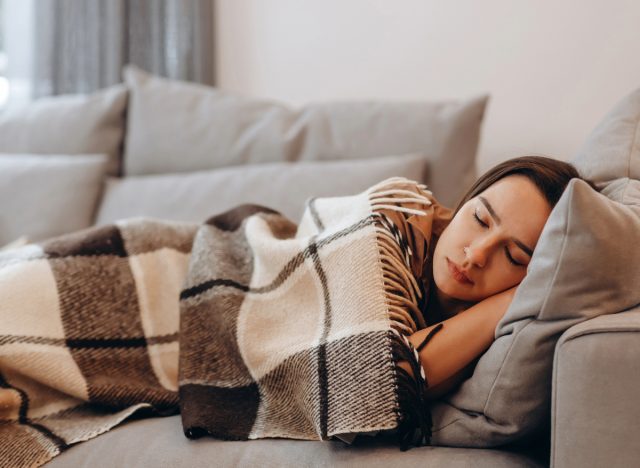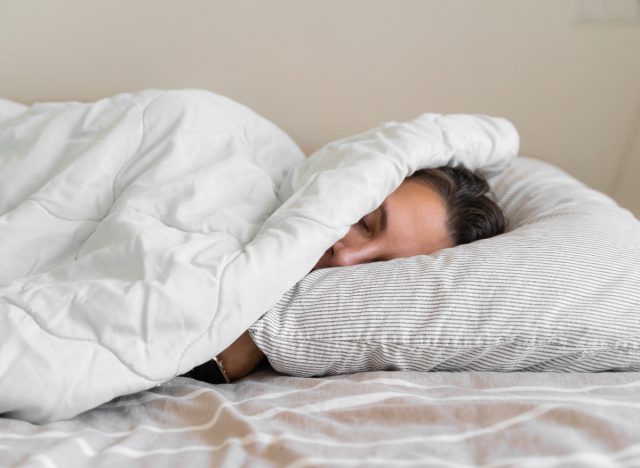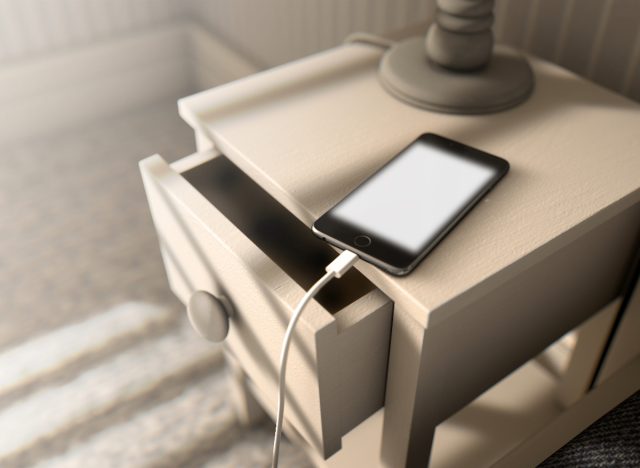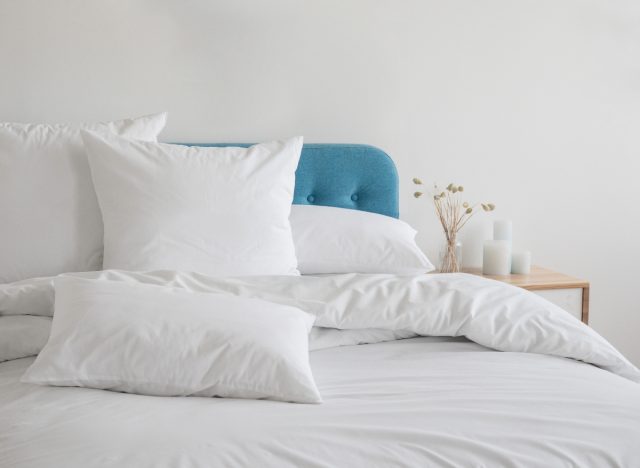9 Things That Can Destroy Your Sleep Quality

We've all had those nights—tossing and turning, unable to shut off that racing mind and get some much-needed rest. And if you struggle to get quality sleep on a regular basis, you may be among the 50 to 70 million Americans with ongoing sleep disorders. Many factors can influence the quality of your slumber, and they often go unnoticed in our daily routines. That's why we chatted with Monique May, MD, medical advisor for Aeroflow Sleep, who reveals nine things that can destroy your sleep quality. The good news is understanding the culprits behind your sleep issues can empower you to make subtle lifestyle changes and make a world of difference in your sleep quality.
Below, we're sharing practical advice backed by science on how to improve your sleep quality naturally. Read on to learn more about the worst things that destroy your sleep quality and what you can do about them. Then, when you're done, check out People Are 'Cricketing' Their Feet To Fall Asleep Faster—and Claim It Works.
Taking long naps

We all love a good nap, but that lengthy midday siesta could ruin your nighttime rest. While a quick power nap can be refreshing, those extended, leisurely naps can disrupt your body's sleep-wake cycle. A 2017 review in Sleep Medicine pointed out that frequent daytime napping can disturb sleep quality and even lead to cognitive decline.
May says, "Keep naps between 20 and 30 minutes and take them before 3 p.m. so they don't disrupt your sleep later that evening."
Having a "nightcap"

That glass of wine or nightcap might seem like a relaxing way to end the day, but it's actually a sneaky sleep disruptor. While alcohol can initially make you tired, it interferes with the deeper stages of sleep, leaving you less rested when you wake up.
According to a 2019 study, alcohol consumption before bed can reduce the time spent in REM sleep, meaning your overall sleep quality suffers. "Alcohol before bed can decrease the deep sleep you get through the night. Also, you may wake up more often as the night goes on," says May.
Sleeping under too many layers

Snuggling into bed with layers of cozy blankets and thick pajamas might be tempting, but overheating can destroy your sleep. Your body temperature naturally drops during sleep, so too many layers can make you uncomfortably warm and negatively impact sleep quality.
"While you may be chilly at first, having too many layers on at night may cause you to sweat and can disrupt sleep, especially if you sweat profusely and have to change clothes or even bedding," explains May.
Keeping your phone in your bedroom

If you keep your phone beside your bed while sleeping, join the club. Unfortunately, however, research shows that the blue light from screens can mess with your circadian rhythm, making it harder to fall asleep.
"While it's common knowledge that the blue light from screens is disruptive to sleep, people may not realize that simply having their phones near them makes it easier to reach for them when they may wake briefly from sleep," says May. "Instead, put your phone on the other side of the room to make it less accessible. Plus, when that alarm goes off in the morning, you have to get up to hit the snooze, making it less likely that you'll oversleep."
Drinking excessive caffeine

While a morning cup of coffee is an enjoyable ritual for countless people, caffeine's stimulating effects can linger in your system for hours. Avoid consuming coffee and other caffeinated beverages like soda too late in the day to safeguard your sleep quality.
"Caffeine can affect sleep for several hours, not just one or two hours before bedtime," explains May. "Since the half-life of caffeine is four to six hours, you may still feel its effects up to six hours later."
Eating too many salty foods

Avoid indulging in salty snacks that can negatively impact your slumber. According to a 2019 study in Frontiers in Neuroscience, high sodium intake was associated with disrupted sleep patterns.
"People may not realize that eating foods high in sodium can lead to fluid retention that causes them to urinate at night," says May. "Reading food labels and eliminating foods high in sodium will help avoid that problem."
Doing an intense workout too close to bedtime

Regular exercise is fantastic for sleep, but not if you're doing it right before bed. Physical activity raises your body temperature and releases adrenaline, making it hard to wind down when it's time to sleep.
"While exercise is good for you, vigorous exercise before bed can be disruptive. Avoid aggressive workouts three to four hours before bedtime. Instead, opt for relaxing and calming activities such as restorative yoga or meditation," says May.
Not showering before bed

A warm shower before bed might sound like a great way to relax, but it's all about timing. Your body naturally cools down to initiate sleep, so having a hot shower too close to bedtime may interfere with this process.
Not using proper pillows

If your pillow doesn't support your neck and head, you might wake up with aches and pains, tossing and turning throughout the night. Studies show that good sleep posture can improve sleep quality.
"Pillows should support the space between your head and shoulders when lying down," says May. "Over time, they become less supportive and can cause neck and back pain or headaches. Pillows also house dust mites, dead skin cells, and other less-than-desirable debris. Experts recommend replacing pillows at least every two to three years and washing pillowcases weekly."
- Source: https://www.nhlbi.nih.gov/health/sleep-deprivation
- Source: https://www.ncbi.nlm.nih.gov/pmc/articles/PMC6572586/
- Source: https://pubmed.ncbi.nlm.nih.gov/30454599/
- Source: https://www.ncbi.nlm.nih.gov/pmc/articles/PMC9420367/
- Source: https://www.ncbi.nlm.nih.gov/books/NBK519490/
- Source: https://www.ncbi.nlm.nih.gov/pmc/articles/PMC6895215/
- Source: https://www.ncbi.nlm.nih.gov/books/NBK499843/
- Source: https://www.ncbi.nlm.nih.gov/pmc/articles/PMC7296409/
- Source: https://www.ncbi.nlm.nih.gov/pmc/articles/PMC7323637/
- Source: https://www.ncbi.nlm.nih.gov/pmc/articles/PMC8544534/









